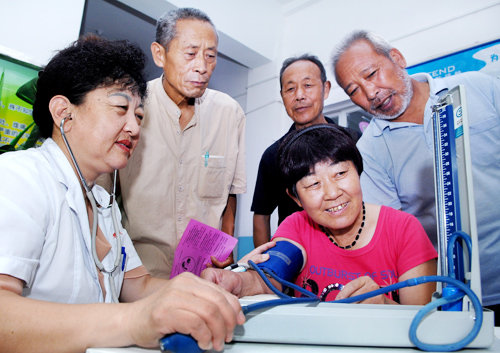|
 |
|
FREE SERVICE: Seniors eligible for minimum living allowance receive free medical examination in Yinchuan City, Ningxia Hui Autonomous Region (LI ZIHENG) |
"Most of the poor with urban residence are already in their 40s or 50s, and they will retire in about 10 years," Song said. In the market economy, the government no longer assigns jobs to urban residents. Many laid-off workers have difficulty finding jobs because of their poor education and age.
China is in the process of rapid urbanization. Every year, 10 million rural people enter cities, but Song said 80 percent of them are poor. China's urbanization process will continue for another three decades until the rate reaches 75 percent, and the number of urban poor is certain to increase.
Given the scale of the problem, governments at all levels have taken action to alleviate urban poverty.
In the Maizidian Neighborhood, 56 of the 93 officially poor families receive a minimum living allowance from the government, with a monthly payment of about 500 yuan ($77).
The government also insures the residents against serious diseases and unemployment, and some organizations, such as the local women's federation and labor union, also offer some forms of assistance. "But most of this assistance is not long-term or regular," said Sun Shouying, a social worker at the Maizidian Neighborhood.
China's minimum living allowance system was established in the1990s. "At the end of 2010, a total of 23.11 million urban residents received this allowance," Song said.
Before the 1990s, only those without the capacity to work and with no income or legal guardian were entitled to government relief.
Following massive layoffs from state and collectively owned enterprises in the 1990s, the Chinese Government promulgated in 1999 the Regulations on Guaranteeing Urban Residents' Minimum Standard of Living.
The regulation stipulates that urban residents with non-agricultural permanent residence whose family's per-capita income is lower than the local urban residents' minimum living standard are entitled to the minimum living allowance from the local government.
But Sun said the minimum living allowance provides only marginal assistance to families that are often deeply indebted and coping with serious diseases. The system also places families with per-capita incomes just slightly above the official minimum living standard in a difficult situation as they do not qualify for any government assistance.
Currently, most poverty alleviation NGOs in China do not have programs targeting the urban poor. "The rural poor are easier to target, and poverty alleviation can make a bigger difference," said Guan Xinping, a professor in the Social Work and Social Policy Department of Nankai University in Tianjin.
The vast majority of urban poverty alleviation programs are conducted by neighborhoods. The Maizidian Neighborhood has launched a number of initiatives to help poor families. In 2007, it launched a Five-Support Program and mobilized local enterprises to offer financial support to needy families, and increase their access to medical services, education and employment.
"So far, the neighborhood has signed agreements with more than 100 enterprises that have promised to donate money or supplies every month," Sun said.
Luo Peng benefited from the program. In 2008, two companies donated a computer to Luo and agreed to cover his Internet surfing expenses.
With access to the Internet, Luo studied English and computer animation, and opened an online store. He also contributes articles to an Internet portal and now has a monthly income of 1,000 yuan ($154). Although he still has to spend 3,000 yuan ($462) per month on medicine, Luo said that only partial self-reliance had already made him feel better both physically and mentally.
| 